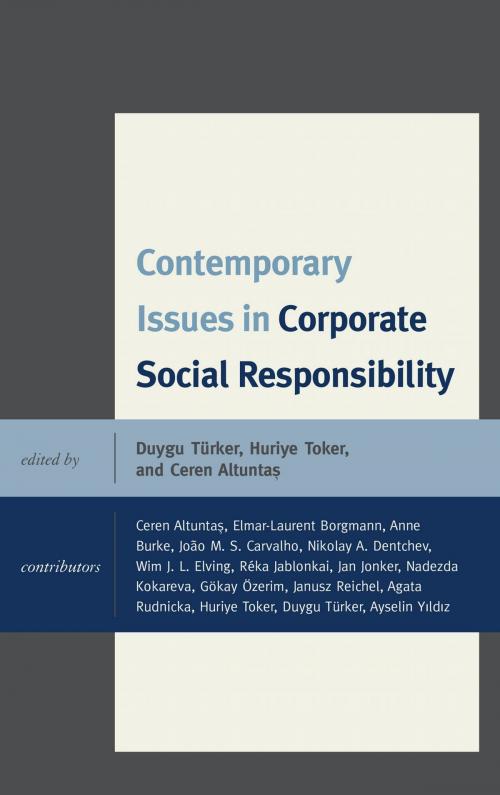Contemporary Issues in Corporate Social Responsibility
Business & Finance, Business Reference, Business Ethics, Economics| Author: | Laurent Borgmann, Anne Burke, João M. S. Carvalho, Nikolay A. Dentchev, Wim J. L. Elving, Réka Jablonkai, Jan Jonker, Nadezda Kokareva, Gökay Özerim, Janusz Reichel, Agata Rudnicka, Ayselin Yildiz | ISBN: | 9780739183748 |
| Publisher: | Lexington Books | Publication: | December 18, 2013 |
| Imprint: | Lexington Books | Language: | English |
| Author: | Laurent Borgmann, Anne Burke, João M. S. Carvalho, Nikolay A. Dentchev, Wim J. L. Elving, Réka Jablonkai, Jan Jonker, Nadezda Kokareva, Gökay Özerim, Janusz Reichel, Agata Rudnicka, Ayselin Yildiz |
| ISBN: | 9780739183748 |
| Publisher: | Lexington Books |
| Publication: | December 18, 2013 |
| Imprint: | Lexington Books |
| Language: | English |
As a result of the industrialization, urbanization, and population increase during the last two centuries, the global landscape has been irreversibly damaged. These anthropological pressures have create endless problems on the global level, and individuals and organizations are beginning to realize their own ever-increasing responsibility to consider the welfare and interests of all stakeholders as a whole. Although the improvements in the legal framework at the national and international level can be viewed as an important step to protect society and the natural environment, a legal course provides a reactive mode of control rather than a proactive approach. Considering its proactive approach and voluntarily basis, the concept of social responsibility can provide a significant tool of generating a sustainable future.
During such a paradigm shift, Contemporary Issues in Corporate Social Responsibility presents the significant roles that universities must embrace in order to take charge of the future. In parallel to those movements, many institutions include a course on social responsibility, yet the studies on the education of social responsibility in the literature show that there is no commonly accepted teaching methods and guiding curriculum of CSR. This book was designed based on the outcomes of an Erasmus Intensive Project (IP) which was organized in Yasar University during June 2012 with the contribution of 9 European universities. Based on the interactive feedback of participants during the project, this book sheds light on the ongoing discussion of corporate social responsibility from a European perspective.
As a result of the industrialization, urbanization, and population increase during the last two centuries, the global landscape has been irreversibly damaged. These anthropological pressures have create endless problems on the global level, and individuals and organizations are beginning to realize their own ever-increasing responsibility to consider the welfare and interests of all stakeholders as a whole. Although the improvements in the legal framework at the national and international level can be viewed as an important step to protect society and the natural environment, a legal course provides a reactive mode of control rather than a proactive approach. Considering its proactive approach and voluntarily basis, the concept of social responsibility can provide a significant tool of generating a sustainable future.
During such a paradigm shift, Contemporary Issues in Corporate Social Responsibility presents the significant roles that universities must embrace in order to take charge of the future. In parallel to those movements, many institutions include a course on social responsibility, yet the studies on the education of social responsibility in the literature show that there is no commonly accepted teaching methods and guiding curriculum of CSR. This book was designed based on the outcomes of an Erasmus Intensive Project (IP) which was organized in Yasar University during June 2012 with the contribution of 9 European universities. Based on the interactive feedback of participants during the project, this book sheds light on the ongoing discussion of corporate social responsibility from a European perspective.















